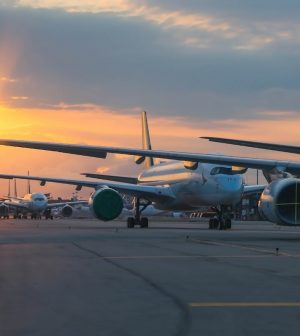- Could Your Grocery Store Meat Be Causing Recurring UTIs?
- Are You Making This Expensive Thermostat Error This Winter?
- Recognizing the Signs of Hypothyroidism
- 10 Strategies to Overcome Insomnia
- Could Artificial Sweeteners Be Aging the Brain Faster?
- Techniques for Soothing Your Nervous System
- Does the Water in Your House Smell Funny? Here’s Why
- Can a Daily Dose of Apple Cider Vinegar Actually Aid Weight Loss?
- 6 Health Beverages That Can Actually Spike Your Blood Sugar
- Treatment Options for Social Anxiety Disorder
Airports Take Big Toll on Sleep of Those Living Nearby

As people living near airports probably already know, all that overhead traffic can take a huge hit to their sleep, a new study confirms.
Night-time aircraft noise increases a person’s risk of tossing and turning in bed as engines roar overhead, researchers reported Sept. 25 in the journal Environmental Health Perspectives.
Airplane noise also appears to disrupt people’s sleep/wake cycles, leading them to fall asleep and wake up at irregular hours, researchers found.
“Higher night-time aircraft noise was linked with disturbed sleep quality, even if people didn’t realize it,” said lead investigator Xiangpu Gong, a postdoctoral researcher with the University of Leicester in the U.K. “Sleep disturbance could have long-term effects on health, so it’s important for policies to address and reduce noise pollution from airplanes.”
For the study, researchers tracked more than 80,000 people living near four major British airports — London Heathrow, London Gatwick, Manchester and Birmingham.
Study participants wore wrist devices that tracked their sleep patterns, and answered questionnaires about their sleep quality.
Researchers compared this sleep data to maps created by the U.K. Civil Aviation Authority that show the level of aircraft noise that occurs in neighborhoods near airports.
People exposed to higher levels of aircraft noise tended to move more while they slept, a sign of sleep disruption, researchers said.
Higher levels of airplane noise was also associated with irregular daily sleep rhythms, even though people spent about the same amount of time in bed.
“Night-time aircraft noise was associated with more restless sleep and disrupted sleep-wake cycles, suggestive of a link between night-time aircraft noise exposure and sleep disturbance,” Gong said in a university news release. “Poorer sleep patterns have been associated with higher risk of mental health problems, conditions like diabetes and obesity and with mortality risk.”
Policymakers should consider these results when weighing whether to add more flights at an airport, said lead researcher Anna Hansell, a professor of environmental epidemiology at the University of Leicester.
“It is of concern that current pressure on airports to increase night flights could result in more night-time aircraft noise from airplanes, with potential impacts on sleep disturbance and ultimately on health,” Hansell said.
More information
The Sleep Foundation has more on noise pollution.
SOURCE: University of Leicester, news release, Sept. 25, 2024
Source: HealthDay
Copyright © 2026 HealthDay. All rights reserved.










